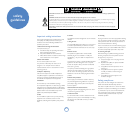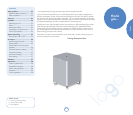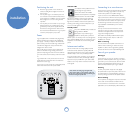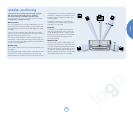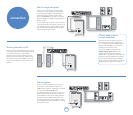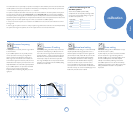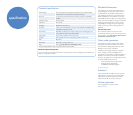
logo
English
E-7
calibration
The subwoofer’s has two jobs: firstly to reproduce accurately and with sufficient power the sub-bass that other
‘smaller’ speakers cannot (the centre speaker is almost always a ‘small’ speaker); and secondly to reproduce the
‘.1’ or low frequency effects (LFE) track of 5.1 or 7.1 material.
For optimum results, the subwoofer must be set up in the correct relation to the other speakers in the system.
The two relevant controls are the crossover point and the subwoofer level. The crossover point establishes
the frequency below which signals are redirected away from ‘small’ speakers toward the subwoofer. Setting the
subwoofer level ensures signals that are of equal volume achieve the same sound pressure level no matter what
frequency they are or which speaker they come from (i.e. subwoofer or satellite speaker).
In most surround-sound systems, two crossovers are available: one in the surround-sound decoder and one in
the Logo unit.
In order to get the optimum sound in a variety of systems, Logo allows these controls to be used independently
for systems with ‘Large’ front speakers and an LFE output from the surround-sound decoder.
Crossover frequency
setting
In most systems, a crossover point for Logo of 90Hz
is recommended.
If your satellite speakers are very ‘Small’ (and thus
cannot reproduce much bass) you might like to
set the crossover point higher than this figure to
allow Logo to do more of the work. However, be
aware that the higher the crossover point, the more
directional the low frequency sounds, thus the more
easily identifiable is the subwoofer’s physical position.
If your satellite speakers can reproduce reasonable
bass, you can try a lower crossover point.
Experimentation and listening will guide you to the
right spot.
Crossover Q setting
The X-OVER Q setting controls the slope of the trace
beyond the cutoff frequency, in dB/octave. The aim
is to make a ‘mirror image’ match with the slope of
the high-pass filter – a steep cut-off of the high-pass
filter from the sound processor/receiver should be
matched by a steep cut-off of the low-pass filter
from Logo. Similarly, if the sound processor/receiver
provides a more gradual cut-off, the
X-OVER Q setting
should have a lower value.
Volume level setting
Accurate volume level setting for a subwoofer ideally
requires specialist measuring equipment such as a
Real Time Spectrum Analyser or RTA. A regular SPL
(Sound Pressure Level) meter will not work for this!
For most systems though simple experimentation
by ear will suffice. Start with a medium setting (5)
and experiment with
VOLUME until low frequency
sounds can be heard as part of the main sound
and not traceable to the subwoofer directly. Most
sound processors or receivers allow Sub levels to be
trimmed ‘on the fly’ to counter excessively high or low
levels from particular source material.
Phase setting
This has two settings: with the PHASE button out (0°)
and with the button in (180°).
A phase delay may be used to counteract the effect
of sound waves from Logo interacting with and
partially cancelling out or unduly emphasising sound
from the satellite speakers. This effect depends
critically on the relative positioning of subwoofer
and satellite speakers and can also be remedied by
relocating the subwoofer a short distance. The phase
setting is available if relocation is not possible or
impractical.
Recommended settings for use
with Muso speakers
Arcam’s Muso satellite speakers ideally
complement the sound quality and design values
of Logo. The recommended settings of Logo for
use with Muso speakers are:
X-OVER FREQ
90Hz
X-OVER Q
0.5
VOLUME
8
PHASE
0°
X-OVER FREQ
35
50
70
85
100
115
125
140
160
0.3
0.5
0.7
0.9
1.1
1.3
1.5
X-OVER Q
PHASE
VOLUME
0
1
2
3
4
5
6
7
8
9
10
0
40 60 80 100 120 140 160
-12
20
Gain,
dB
Crossover frequency, Hz
0
-12
Q=1.5
Q=1.0
Q=0.71
Q=0.49
Q=0.58
Q=0.3
Crossover frequency
Gain,
dB




